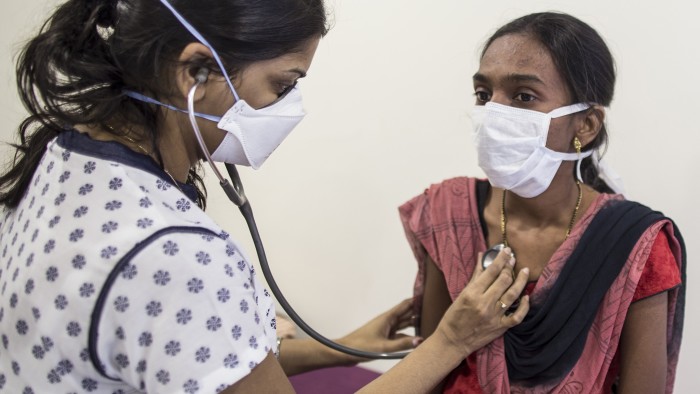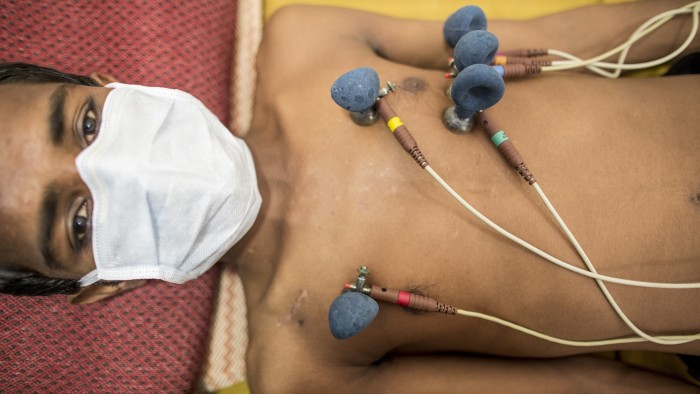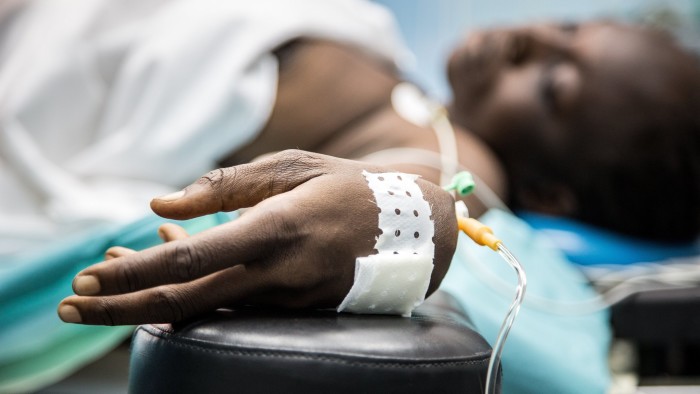Doctors Without Borders: MSF helps battle drug-resistant TB in India

Roula Khalaf, Editor of the FT, selects her favourite stories in this weekly newsletter.
Priyanka Bhalekar, a 29-year-old schoolteacher from a town outside Mumbai, was diagnosed with tuberculosis in 2009. After six months of treatment, supervised by her family doctor, she seemed to be cured. She got married, and three years ago had a baby daughter.
But a few months after the birth, Ms Bhalekar fell ill again, suffering from fevers, coughs and exhaustion. She was diagnosed with drug-resistant tuberculosis — the start of a protracted ordeal whose outcome still hangs in the balance.
Two years of treatment overseen by an Indian government hospital was unsuccessful. Finally, the young mother was referred to a small TB clinic run by Médecins Sans Frontières, the FT’s Seasonal Appeal partner. MSF is now trying to help her access new TB drugs that could save her.
The drugs — Johnson & Johnson’s bedaquiline and Otsuka’s delamanid — are the first new tuberculosis drugs in more than half a century, and can significantly improve cure rates for patients with multi-drug resistant TB.
But they are being rationed in India due to limited supply in the country. Patients must apply both to the drugmaking companies and to Indian government officials for individual permission to import the drugs. It is an arduous process that requires complex paperwork and multiple trips by the ailing patient to a customs warehouse at Mumbai’s airport to collect the drugs in person.
MSF is advising Ms Bhalekar, whose husband is a draughtsman, on navigating this complex maze to get the medicine she needs. “This is my last option,” she says. “If I fail on that, I lose my life.”

For MSF, helping multi-drug resistant TB patients is part of a far broader battle to improve access to life-saving medicines for citizens of poor countries, where people — and the diseases that often afflict them — are largely ignored by the pharmaceutical industry in the current, patent-driven drug research and development system.
FT Seasonal Appeal 2016
Doctors on the front lines

●
‘If we don’t treat them, who else will?’
Erika Solomon talks to MSF staff in Syria, Yemen and Iraq
●
Congo: journey to the centre of a typhoid epidemic
David Pilling joins MSF’s team battling the disease in DRC
●
A letter from the editor
Lionel Barber introduces this year’s seasonal appeal in support of MSF
The effort began in 1999 when Dr James Orbinski, then president of MSF International, vowed to confront the “injustice” of people in developing countries dying of Aids and TB because they could not get access to the same life-saving drugs being used for successful treatment of patients in wealthier countries — a problem he ascribed to “market failure”.
MSF set up a dedicated policy analysis team to campaign — and fight legal battles — for better drug access and production of more affordable generic drugs. It was a dramatic shift for a charity more accustomed to providing front-line medical services.
“The access campaign was a revolution for MSF,” said Dr Tido Von Schoen-Angerer, who was the campaign leader for six years.
MSF’s first target was the patents keeping life-saving antiretroviral drugs prohibitively expensive — and out of reach — for millions of Africans and Asians infected with HIV.
In 2002, MSF lawyers and pharmacists backed Aids patients from Thailand in a challenge to Bristol-Myers Squibb’s local patent on its Aids drug, didanosine, which a Thai government agency wanted to produce generically. Until then, patent battles were fought only between rival drug companies, vying for financial advantage.

But the Thai judge ruled that Aids patients were also “interested parties” with standing to challenge patents — a groundbreaking precedent that reverberated globally. BMS dropped its case, paving the way for generic production of the much needed drug in Thailand.
“It was the first time in law anywhere in the world that a judge ruled that a patient can be an interested party,” recalls Paul Cawthorne, then MSF’s country head in Thailand. “Previously, patients were a side issue with nothing to say about the price of medicines.”
Nearly two decades on, MSF is still challenging many drug patents, such as the patent for Gilead Sciences’ Hepatitis C drug sofosbuvir, which has been priced at $1,000 per pill in the US, though it is being sold for less in developing countries. It also closely monitors trade negotiations and how they might affect intellectual property rights and generic drug production.
In this effort, India is a principal focus — not just because of its large patient base but due to its vast generic drug industry, which has been both willing and able to churn out affordable copies of life-saving medicines that can be supplied to poor patients all over the world.
In recent years, international pharmaceutical companies — backed by western governments — have tried to curb the Indian generics drug industry through tighter patent laws and trade deals.
But, as a large buyer of Indian-made generic drugs for its global programmes, MSF has allied itself with Indian activists seeking to resist such pressure. “India as a producer is absolutely key for MSF, but it has been under threat,” said Dr von Schoen-Angerer.

MSF was an active part of the coalition that lobbied for a unique provision in India’s 2005 patent law, which sets a higher-than-usual standard for granting patents — and makes it harder for drug companies to extend those patents by making minor changes (a controversial process known as “ever-greening”).
The charity closely monitors trade talks that could impinge on India’s generic drug production, as well as Indian court cases that could have repercussions on the generic drugs industry. “Our work in India is central to preserving generic competition,” says Leena Menghaney, a New Delhi-based lawyer who is part of the access campaign. But it is a tough challenge. “It’s very clear that the next generation of new medicines are not going to be easily produced in India,” Ms Menghaney said.
MSF is now promoting alternatives to what it calls the “broken” patent system, which it says offers no incentive for new research on cures for diseases — such as TB — that largely afflict poor patients. MSF has co-founded the Drugs for Neglected Diseases Initiative, a collaboration that is capitalising on existing yet incomplete research, to develop drugs to treat diseases of little interest to global pharmaceutical companies.
The fight for access to existing drugs — especially those not produced in India — continues. Hanif Sheikh, 25, says his life has been transformed by MSF, which helped him secure both bedaquiline and delamanid to treat his drug-resistant TB. Eight months in, he is non-infectious and well enough to start working as a shoe salesman in a shopping mall — his first job in years.
“It’s like a second life offered to me,” he said.

But Ms Bhalekar hasn’t been so lucky. With MSF’s advice, she has managed to obtain a supply of delamanid, but has so far been unable to secure bedaquiline, despite approval in principle from the government. Without that, she must instead take another antibiotic intravenously, a painful and depressing process.
She is determined to fight on to obtain bedaquiline. In the meantime, she must keep her daughter at a distance and wear a mask to avoid infecting her.
“I want to hold my child close to me, but I can’t do it . . . ” she says. “I am waiting for bedaquiline.”
Listen to the podcast: On the front lines in Yemen
—
All donations received before January 31, 2017, will be matched, up to £300,000, by The ELMA Relief Foundation, a private charitable foundation that supports communities affected by man-made or natural disasters.
Comments